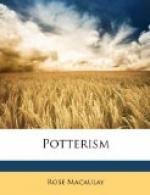’Sometimes. That’s Peacock’s fault, not mine. ... Send along anything you think may suit, by all means, and we’ll consider it. You’ll most likely get it back—if you remember to enclose a stamped envelope. ... Good-night, and thank you for asking me to your party. Good-night, Hobart.’
I said good-bye to Lady Pinkerton, and went back to the Fact office, for it was press night.
So Jane got married.
CHAPTER II
DINING WITH THE HOBARTS
1
That May was very hot. One sweltered in offices, streets, and underground trains. You don’t expect this kind of weather in early May, which is usually a time of bitter frosts and biting winds, punctuated by thunderstorms. It told on one’s nerves. One got sick of work and people. I quarrelled all round; with Peacock about the paper, with my typist about her punctuation, with my family about my sister’s engagement. Rosalind (that was the good old English name they had given her) had been brought up, like myself, in the odour of public school and Oxford Anglicanism (she had been at Lady Margaret Hall). My father had grown up from his early youth most resolutely English, and had married the daughter of a rich Manchester cotton manufacturer. Their two children, Sidneys from birth, were to ignore the unhappy Yiddish strain that was branded like a deep disgrace into their father’s earliest experience. It was unlucky for my parents that both Rosalind and I reverted to type. Rosalind was very lovely, very clever, and unmistakably a Jewess. At Roedean she pretended she wasn’t; who wouldn’t? She was still there when I came of age and became Gideon, so she didn’t join me in that. But when she left school and went up to Oxford, she began to develop and expand mentally, and took her own line, and by the time she was twenty she was, as I never was, a red-hot nationalist. We were neither of us ever inclined to Judaism in religion; we shook off the misfit of Anglicanism at an early age (we both refused at fifteen to be confirmed), but didn’t take to our national faith, which we both disliked extremely. Nor did we like most of our fellow Jews; I think as a race we are narrow, cowardly, avaricious, and mean-spirited, and Rosalind thinks we are oily. (She and I aren’t oily, by the way; we are both the lean kind, perhaps because, after all, we are half English). I only reverted to our original name because I was sickened of the Sidney humbug. But we learnt Yiddish, and read Hebrew literature, and discussed repatriation, and maintained that the Jews were the brains of the world. It was a cross to our parents. But far more bitter to them than even my change of name was Rosalind’s engagement, this spring of 1919, to Boris Stefan. Boris had been living and painting in London for some years; his home had been in Moscow; he had barely escaped with his life from a pogrom in 1912, and had since




